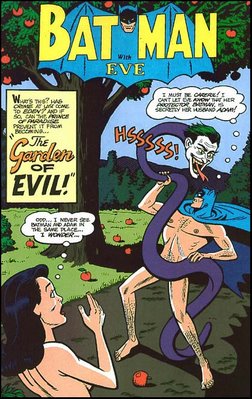Gregory was convinced, as were his desert-dwelling predecessors, that the Christian life is a life of spiritual warfare on an invisible battlefield. The stakes here are the highest: eternity in the kingdom of heaven or everlasting perdition. Those who can see clearly owe help to those who cannot; souls are at stake, and lack of spiritual vision can be deadly. For Gregory, this meant that the saint and the holy man are absolutely essential to the Christian community: "To lesser mortals blinded by the Fall, they reveal the invisible world which is always very much present." It is the role of these mediators between carnal and the spiritual realms to reveal what they see, no matter how dire the vision and unwelcome the message.
Dante is one of those guides who has been sent to reveal the invisible world. In fact, the power of Dante's Inferno is such that even a prosaic retelling such as
Inferno by Larry Niven and Jerry Pournelle has a sobering effect.
I only wish I could say that it's scaring the sin out of me. Alas, I am all too human so my sins are none so easy to banish. However, reading this book definitely is making me consider my own life in a light I hadn't before. Specifically, I recognized something that heretofore I had not considered to be a big deal. Not having read the original book
(which I plan on doing), I have to give Niven and Pournelle credit for applying larger sins to specific, modern traits. Here is a vivid example.
"Fortune tellers," Benito said before I could ask. "They tried to see the future by magic." ...
Then I recognized one of the damned.
A little elderly lady, very prim and proper. She'd been a teacher in my nephew's school. Now she walked with her head turned backward, and tears ran down her spine and between her buttocks. I screamed. The damned looked up at me.
"Mrs. Herrnstein! Why?" I shouted.
She looked away. Then she stopped and looked up. Face and back turned toward us. She's always been thin, and I'd never thought of her as particularly feminine. Certainly she wasn't feminine now. "I belong here, Mr. Carpentier," she called. "Please leave. I don't want to be watched."
"You belong here?" I could not see Mrs. Herrnstein with a crystal ball.
"Yes. Whenever I had a pupil who had difficulty learning to read, I used -- I was a bad teacher, Mr. Carpentier."
"You were a good teacher! You taught Hal more in a year than he learned in five!"
"I was a good teacher with good pupils. But I could not be bothered with the ones who weren't so bright. If they had trouble learning to read, I said they had dyslexia."
"Are you here because of bad diagnoses?" This was monstrous!
"Dyslexia is not a diagnosis, Mr. Carpentier. It is a prediction. It is a prediction that says that this child can never learn to read. And with that prediction on his record --- why, strangely enough, none of them ever do. Unless they happen on a teacher who doesn't believe in educationese witchcraft."
"But--"
"It was witchcraft, Mr. Carpentier. Please go now." She walked on, crying uncontrollably, her face toward us as she walked away. I watched until she was out of sight.
Please note that the authors were pointing out that this teacher deliberately used the "dyslexic" label for any child she had trouble teaching to read, without actually bothering to find out if they had any learning disabilities.Considering my own life in light of the circle after circle of sins after sins has left me with a much better understanding of those holy saints who constantly referred to themselves as weak and pitiful sinners. It is not a false humility they were applying but their vivid understanding of what sins do to our souls and what the punishment is likely to be if we do not repent and try to correct our faults.
During this consideration, it was quite fortunate that Steven Riddle's ruminations led me to also reflect on how to try to change destructive patterns of recurring sin.
It is these recurrent sins that give me the clues to the particular virtues I need to cultivate to combat them. ...
Self-denial then, is one step, one positive thing that we can assent to, that leads us away from the predominant fault. We can recognize the pattern, recognize the root, make use of the sacraments and pray for the strength to stay away from that fault. Moreover, we would do well in addition to praying against to pray in the presence of what we seek. Looking at Jesus is probably more efficacious in the fight against sin than putting up arms against a sea of troubles. Because no matter what we think, it is not our own opposition that ends them.
... God will give the grace, Jesus will supply the strength and the moment. However, none of this will be efficacious if we do not first seek guidance and understanding about what is tempting us and then (with the strength of the sacraments and Grace) resolutely decide not to give in just this one time. When we do this one-time by one-time, God gradually gives us victory over the sin--often allowing us to go our own way to show just how weak we are on our own. But nevertheless, it is the repeated pattern that will give us the focus and the spirit of clinging to God that will gradually lead us away from our sins.
That "one-time by one-time" really resonated with me. It makes me remember something that I read (and now don't remember where) that I believe a saint said about it being all very well to
think about changing our ways but that we must make the effort to forcibly apply our will to the problem. That is our cooperation with Jesus. Sometimes it is all too easy to dismiss sins as small and nonconsequential and, when we continue in our patterns, to say, "Jesus please help me!" while we sit back and wait for ourselves to automatically change.
No.
We must apply the effort. Then if we fail on that particular issue we have at least been
fighting instead of sitting back and waiting for change to be dropped in our laps. Yes, I am so very guilty of this.
It is also a matter of keeping in mind that if we keep "glancing at God" to see if we are on the right track we will then be able to apply it to our lives in general. And it is along that path that we will find positive change and growth.
The practice of the virtue of faith in our daily lives adds up to what is commonly known as supernatural outlook. This consists in a way of seeing things, even the most ordinary, apparently quite commonplace things, in relation to God's plan for each person as regards his own salvation and the salvation of many others. It leads us to accustom ourselves to undertake our daily activities as though we were constantly glancing at God to see whether what we are doing is really his Will whether ours is the way He wants us to do things. It leads us to get used to discovering God in people, to recognize him behind what the world calls chance or coincidence, in fact, to see his mark everywhere. (F. Suarez, On being a Priest)
I originally intended this to be a book review and it turned into a quite different reflection. (See
here for a partial review.) However, I think that you can see Dante's vision peering through the lens used by these two science fiction writers. It is still a very good read just from a sci-fi point of view. I disagree with their lack of a "hard stance" on souls having earned damnation. They shied away from this and turned it into Purgatory's front steps. However, in the sci-fi realm that is quite acceptable.
I hear that the authors are working on Inferno II which I assume will be about Purgatory. Not only do I eagerly await that book but I hope that perhaps it will make the publishers consider republishing Inferno. It is something that I can quite easily see our book club tackling ... reading "Dante lite" to interest people in the real thing.
RELATED LINKS
- The Divine Comedy, translated by Longfellow, was just published a few days ago by Librivox as a free audiobook. How's that for timing?
- One of the other effects of this book was to make me quite annoyed with the fact that no one "on the watchtower" (this would be homilists) do enough to remind us of the reality of Hell. Yeah, maybe Hell and Purgatory are painful just because of our separation from God but maybe, just maybe, all those stories about flames and torments are true. I don't seem to remember Jesus saying, "Oh by the way y'all, this is just symbolic" when he talked about Hell time after time after time. All that is to say, here is a link to the Pertinacious Papist's reflections about Hell, using an essay by Tom Bethell as a springboard.
- Fascinating reading, after I finished the book, was found in this essay which compares Inferno to Dante's original work. I do not necessarily agree with every conclusion the author draws about the Niven's and Pournelle's modernization of the story (again, for example, I disapprove of their softening of the finality of Hell) but these are very slight differences of opinion between us and I highly recommend it. Note: spoilers necessarily are included, especially about Inferno.
- Into the Deep has a series about Spiritual Combat which has just begun. It ties in quite nicely with this overall theme.




